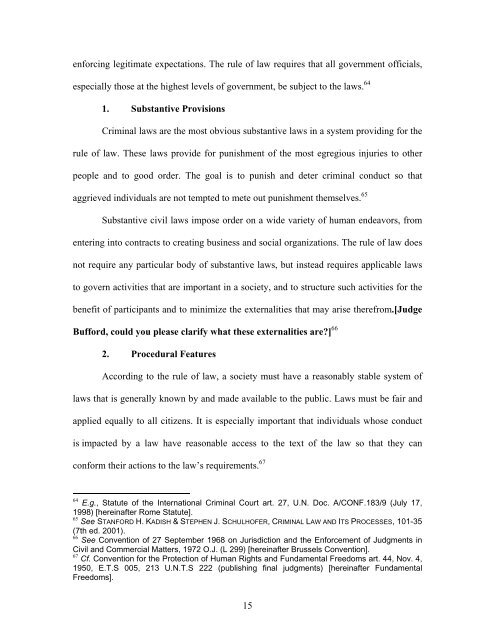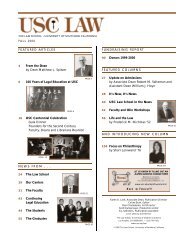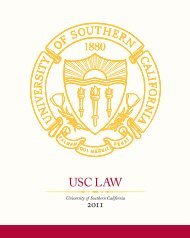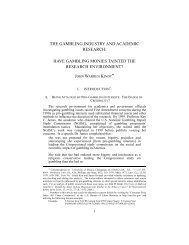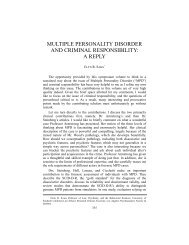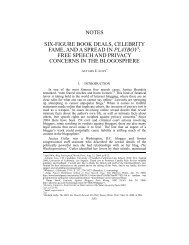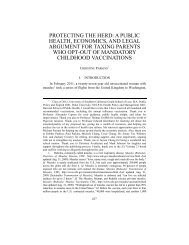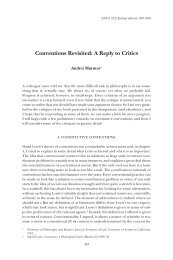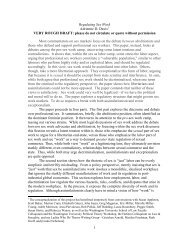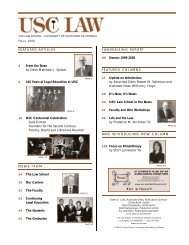Bufford Defining the Rule of Law
Bufford Defining the Rule of Law
Bufford Defining the Rule of Law
Create successful ePaper yourself
Turn your PDF publications into a flip-book with our unique Google optimized e-Paper software.
enforcing legitimate expectations. The rule <strong>of</strong> law requires that all government <strong>of</strong>ficials,<br />
especially those at <strong>the</strong> highest levels <strong>of</strong> government, be subject to <strong>the</strong> laws. 64<br />
1. Substantive Provisions<br />
Criminal laws are <strong>the</strong> most obvious substantive laws in a system providing for <strong>the</strong><br />
rule <strong>of</strong> law. These laws provide for punishment <strong>of</strong> <strong>the</strong> most egregious injuries to o<strong>the</strong>r<br />
people and to good order. The goal is to punish and deter criminal conduct so that<br />
aggrieved individuals are not tempted to mete out punishment <strong>the</strong>mselves. 65<br />
Substantive civil laws impose order on a wide variety <strong>of</strong> human endeavors, from<br />
entering into contracts to creating business and social organizations. The rule <strong>of</strong> law does<br />
not require any particular body <strong>of</strong> substantive laws, but instead requires applicable laws<br />
to govern activities that are important in a society, and to structure such activities for <strong>the</strong><br />
benefit <strong>of</strong> participants and to minimize <strong>the</strong> externalities that may arise <strong>the</strong>refrom.[Judge<br />
<strong>Bufford</strong>, could you please clarify what <strong>the</strong>se externalities are?] 66<br />
2. Procedural Features<br />
According to <strong>the</strong> rule <strong>of</strong> law, a society must have a reasonably stable system <strong>of</strong><br />
laws that is generally known by and made available to <strong>the</strong> public. <strong>Law</strong>s must be fair and<br />
applied equally to all citizens. It is especially important that individuals whose conduct<br />
is impacted by a law have reasonable access to <strong>the</strong> text <strong>of</strong> <strong>the</strong> law so that <strong>the</strong>y can<br />
conform <strong>the</strong>ir actions to <strong>the</strong> law’s requirements. 67<br />
64<br />
E.g., Statute <strong>of</strong> <strong>the</strong> International Criminal Court art. 27, U.N. Doc. A/CONF.183/9 (July 17,<br />
1998) [hereinafter Rome Statute].<br />
65<br />
See STANFORD H. KADISH & STEPHEN J. SCHULHOFER, CRIMINAL LAW AND ITS PROCESSES, 101-35<br />
(7th ed. 2001).<br />
66<br />
See Convention <strong>of</strong> 27 September 1968 on Jurisdiction and <strong>the</strong> Enforcement <strong>of</strong> Judgments in<br />
Civil and Commercial Matters, 1972 O.J. (L 299) [hereinafter Brussels Convention].<br />
67<br />
Cf. Convention for <strong>the</strong> Protection <strong>of</strong> Human Rights and Fundamental Freedoms art. 44, Nov. 4,<br />
1950, E.T.S 005, 213 U.N.T.S 222 (publishing final judgments) [hereinafter Fundamental<br />
Freedoms].<br />
15


